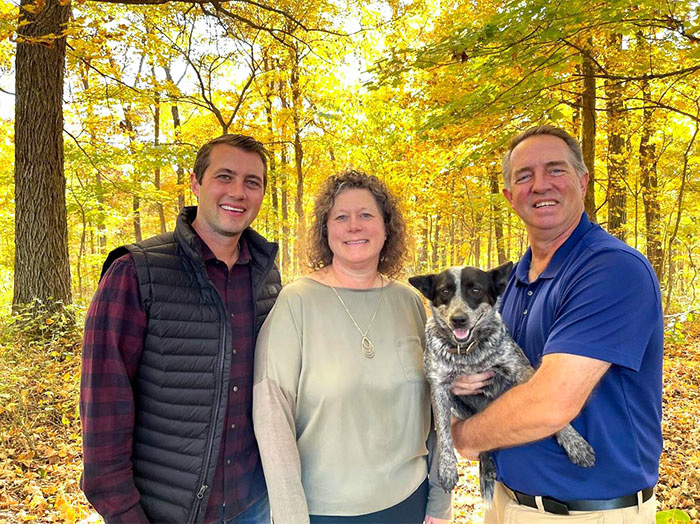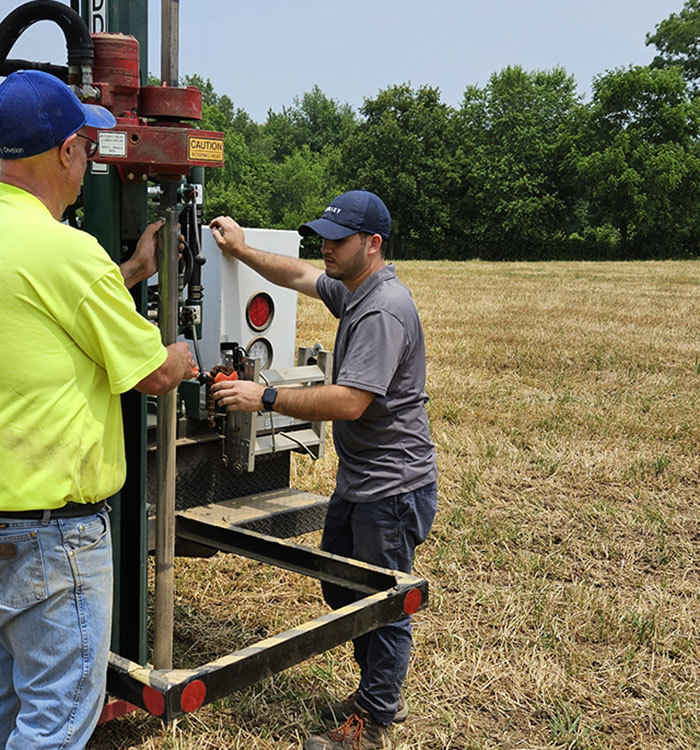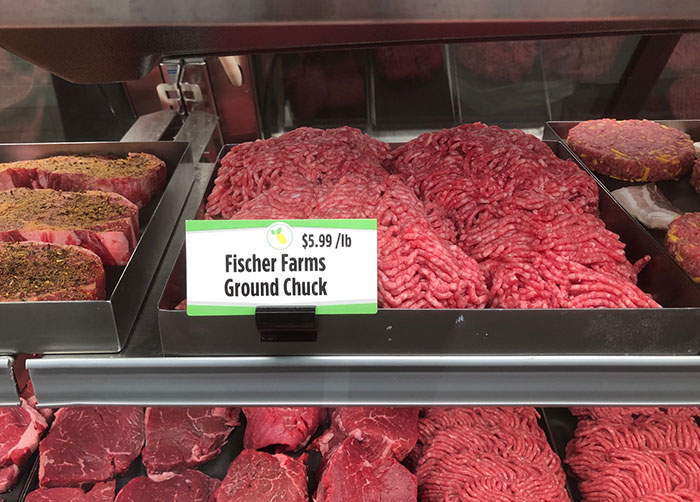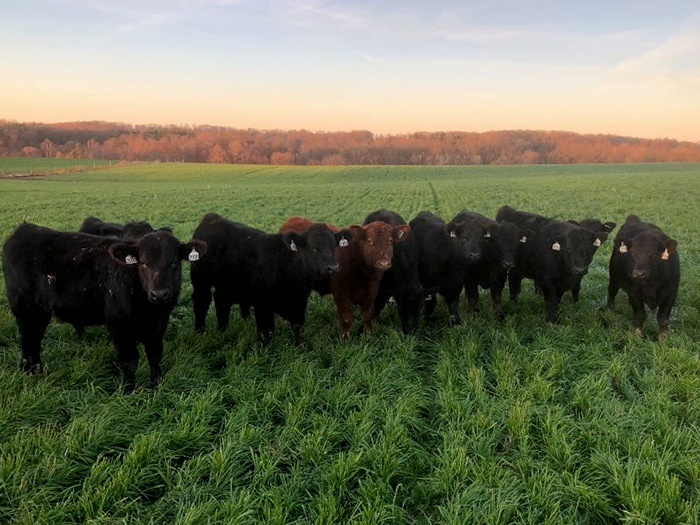Effective beginning 5/20/2025: Please note this site is under review and content may change.
Dave Fischer of Fischer Farms located in St. Anthony, Indiana, has made a name for his business in the tri-state region of Indiana, Kentucky, and Ohio providing high-quality local beef. Now he wants to take the next step forward – creating a climate-smart carbon-negative “hoofprint” for his meat products.
His Fischer Farms Ultimate Beef Strategy is one of approximately 140 grant projects being funded by the USDA’s Partnerships for Climate-Smart Commodities. USDA is investing $3 billion to build and expand markets for commodities made with climate-smart practices. The department hopes to increase the competitive advantage of U.S. agriculture both domestically and internationally, building wealth in rural communities. These climate-smart projects support a diverse range of producers and operations as they voluntarily adopt climate-smart agricultural practices and market their climate-smart commodities.
With the climate-smart commodities’ grant funding, Fischer is building a farm-to-buyer approach that will establish a farmer network to implement climate-smart production practices backed by scientific measurement and monitoring to ultimately create verifiable climate-smart beef and pork products for consumers.

“We expect to be able to arm our consumers with data that shows how their purchasing decisions influence their carbon footprint. Quantifying the amount of carbon captured per acre (or per pound of meat), allows our institutional partners to demonstrate to their stakeholders that they also care about sustainability,” said Fischer.
Early in 2023, soil scientists from USDA’s Natural Resources Conservation Service (NRCS) in Indiana and Kentucky provided soil sampling assistance in collaboration with Fischer, Indiana University, and Geospherics, LLC, which is a private company that helps find low carbon energy solutions. Dave is extremely
enthusiastic about springboarding off that data collection to help inform this project.
The group collected over 80 soil cores, 1.25 meters deep, to be evaluated for baseline carbon data, soil physical properties and fragipan depths. Climate-smart practices including intensive crop rotation with annual ryegrass and sorghum-sudan grasses, rotational grazing, and manure applications have already increased the thickness and the organic matter content of the topsoil horizon considerably compared to other areas in the region.

The project partners , including Fischer Farms Natural Foods, LLC, Indiana University and Carbon Solutions, hope that the rigorous sampling, first-of-a-kind monitoring and innovative analysis will further their study of the impact of climate-smart agriculture practices that sequester carbon and reduce greenhouse gases, delivering beef to the market that is truly a climate-smart commodity.
“Cattle can sometimes be unfairly portrayed for their impact on the climate without accounting for the full carbon cycle,” Fischer said. “This project will model the end-to-end carbon footprint of regeneratively raised [climate-smart] beef to demonstrate the true carbon footprint and role that cattle production can have in positively impacting our climate.”
The operation’s climate-smart practices span from field to table, consisting of a unique combination of rotational grazing, solar energy, intensive forage/crop rotation, kelp feed additive (which Fischer indicates as reducing methane production by 10 to 30%), and efficient supply-chain logistics.
Over the course of the multi-year project, the soil scientists will return to monitor the changes in the soils’ characteristics as a result of the climate-smart practices that participating farmers are implementing.
Bernie and Mark Gutgsell are third-generation farmers in Schnellville, Indiana, and are a part of a network of 22 small farms participating in the Fischer Farms Ultimate Beef Strategy project. They focus on raising hormone-free, antibiotic-free natural beef and pork.

“After the pandemic, we had a lot more customers who wanted that transparency - wanted to know where their food was coming from and how it was being raised,” Gutgsell said. “The customer relationship that formed as a result means a lot to me. I have people coming up to me saying ‘That’s the best steak that I ever had.’ The quality matters and using climate-smart practices is another way to set our product apart from the rest.”
Gutgsell is already seeing a difference with some of the practices that he’s implemented, including planting an approved cover crop mix.
“The rye cover crops hold more moisture in the ground and the root system is deep, which helps keep the soil on the field,” he said. “We also feed it to the cattle along with the kelp that is supposed to reduce emissions. With the better feed, we expect healthier cattle, which results in a more flavorful product.”

By building demand for climate-smart beef under the Fischer Farms Climate-Smart brand, Fischer also sees this project as a boost to supporting small family farms in the area and strengthening local communities economically. Participating farmers are given incentives to implement climate-smart practices and are also paid a premium for their animals.
“A lot of little farms are disappearing,” Gutgsell said. “Dave’s project has been good for the whole community and the premium keeps us in business and keeps our family farm going.”
With a commitment to marketing top quality beef, the Fischer Farms Ultimate Beef Strategy builds on a foundation of years of studying USDA techniques and university research and working through the details of making these practices work for their soil, geography, and climate. Key climate-smart practices implemented at Fischer Farms include no-till, cover crops, and rotational grazing. Additional innovative techniques in biology, summer annual grazing techniques, and crop diversity/selection are currently being trialed with the goal of reducing or eliminating chemical inputs.
“Fischer Farms is excited to continually try new things that can push the envelope to help make farms more sustainable both from an environmental standpoint and economically so that family farms can continue on for future generations,” said Fischer.
By supporting a diverse range of producers and operation types, USDA and its partners are innovating a number of climate-smart solutions that impact numerous natural resource concerns while also strengthening rural economies by diversifying revenue streams. To learn more about the Fischer Farms Ultimate Beef Strategy and other Partnerships for Climate-Smart Commodities projects, visit the project dashboard. Interested producers can learn more about projects in their state by commodity type and climate-smart practice implementation and can access project sign-ups via the site.
Brooke DeCubellis works on USDA’s Partnerships for Climate-Smart Commodities and Dena Anderson works at USDA’s Natural Resources Conservation Service


